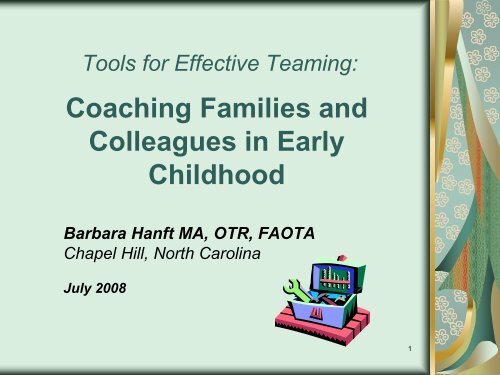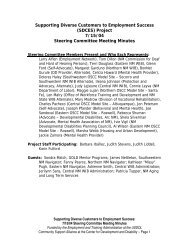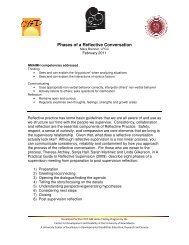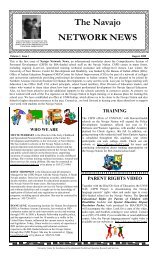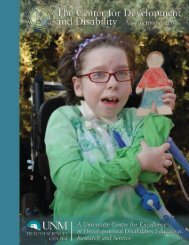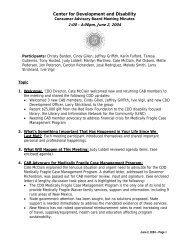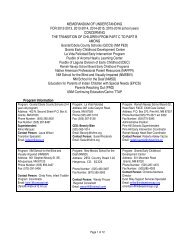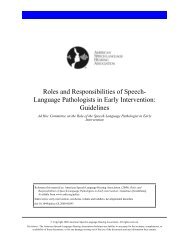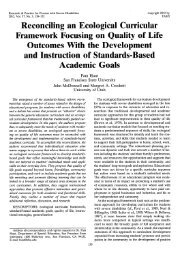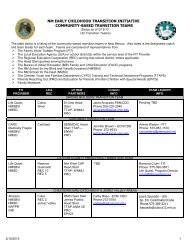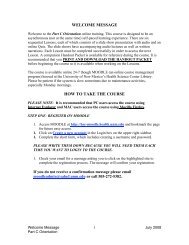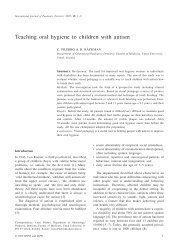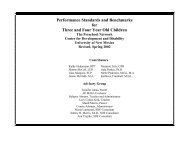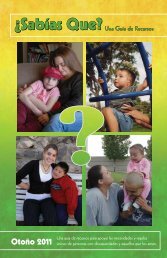Coaching Families and Colleagues in Early Childhood (PPT ...
Coaching Families and Colleagues in Early Childhood (PPT ...
Coaching Families and Colleagues in Early Childhood (PPT ...
You also want an ePaper? Increase the reach of your titles
YUMPU automatically turns print PDFs into web optimized ePapers that Google loves.
Tools for Effective Team<strong>in</strong>g:<br />
<strong>Coach<strong>in</strong>g</strong> <strong>Families</strong> <strong>and</strong><br />
<strong>Colleagues</strong> <strong>in</strong> <strong>Early</strong><br />
<strong>Childhood</strong><br />
Barbara Hanft MA, OTR, FAOTA<br />
Chapel Hill, North Carol<strong>in</strong>a<br />
July 2008<br />
1
Goals for today<br />
Illustrate how coach<strong>in</strong>g families <strong>and</strong><br />
colleagues promotes children’s<br />
participation <strong>in</strong> home <strong>and</strong> community life<br />
Discuss the key components of coach<strong>in</strong>g-<br />
observation-action-reflection<br />
Review communication <strong>and</strong> <strong>in</strong>terpersonal<br />
skills that support effective coach<strong>in</strong>g<br />
partnerships<br />
2
<strong>Coach<strong>in</strong>g</strong>, through reflection,<br />
emphasizes learn<strong>in</strong>g to:<br />
“do with”<br />
<strong>in</strong>stead of<br />
“do to” partners.<br />
Matt<strong>in</strong>gly & Flem<strong>in</strong>g, 1994<br />
3
Your role as coach…<br />
Build<strong>in</strong>g partner’s competence by<br />
ref<strong>in</strong><strong>in</strong>g a partner’s skills/knowledge<br />
through guid<strong>in</strong>g <strong>and</strong> self-discovery<br />
<strong>and</strong><br />
Assist<strong>in</strong>g partner to identify <strong>and</strong><br />
implement strategies to help a child<br />
participate <strong>in</strong> early childhood<br />
sett<strong>in</strong>gs/programs<br />
4
Key components of <strong>Coach<strong>in</strong>g</strong><br />
Resolution<br />
Initiation<br />
Observation<br />
Evaluation<br />
(Hanft, Rush, & Shelden, 2004)<br />
Action<br />
Reflection<br />
Cont<strong>in</strong>uation<br />
5
Read<strong>in</strong>ess for coach<strong>in</strong>g.<br />
I offer objective feedback to colleagues.<br />
I am open to suggestions from colleagues.<br />
It’s helpful when a colleague sees what I do<br />
<strong>and</strong> gives me feedback.<br />
6
Process is <strong>in</strong>teractive <strong>and</strong> cycles<br />
back <strong>and</strong> forth between….<br />
Reflection<br />
Action<br />
Observation<br />
7
Actions……<br />
Visual learn<strong>in</strong>g<br />
partner observes<br />
coach<br />
partner observes<br />
peers<br />
partner watches<br />
video<br />
partner reads an<br />
article <strong>and</strong>/or looks<br />
at illustration<br />
Auditory learn<strong>in</strong>g<br />
partner summarizes<br />
feedback from coach<br />
partner narrates<br />
actions watch<strong>in</strong>g a<br />
video<br />
partner listens to<br />
audiotape<br />
partner talks to<br />
another partner<br />
K<strong>in</strong>esthetic learn<strong>in</strong>g<br />
partner keeps journal<br />
of actions/reflections<br />
partner rehearses<br />
actions <strong>in</strong> m<strong>in</strong>d<br />
partner practices<br />
actions<br />
partner demonstrates<br />
actions to others<br />
8
<strong>Coach<strong>in</strong>g</strong> skills… support<strong>in</strong>g<br />
observation, action & reflection<br />
Observe: actions, reactions, <strong>in</strong>teractions<br />
Listen: attend, acknowledge, associate<br />
Respond: probe, summarize,<br />
feedback/<strong>in</strong>fo, problem solve<br />
Plan: clarify, identify action/strategies<br />
9
Video Vignette: Jacob<br />
Observe how Heidi (PT) <strong>in</strong>teracts<br />
with Holly (mother) us<strong>in</strong>g-<br />
Observation:<br />
Action:<br />
Reflection:<br />
10
Observations are outcome<br />
related <strong>and</strong> <strong>in</strong>clude-<br />
Colleague’s behavior<br />
Nonverbal communication, comments,<br />
<strong>in</strong>teraction <strong>and</strong> actions <strong>in</strong> response to<br />
events, others <strong>and</strong> the coach<br />
Reactions of others to the learner<br />
acceptance of learner’s actions<br />
Physical <strong>and</strong> social environment<br />
# 1-3 on <strong>Coach<strong>in</strong>g</strong> Self Assessment<br />
11
Listen<strong>in</strong>g …<br />
Attend<strong>in</strong>g to present <strong>in</strong>teractions<br />
direct eye contact, positive facial expressions,<br />
an open body posture, close proximity to the<br />
speaker, be<strong>in</strong>g quiet<br />
Acknowledg<strong>in</strong>g<br />
respond verbally <strong>and</strong> nonverbally without<br />
agree<strong>in</strong>g or disagree<strong>in</strong>g with colleague<br />
Associat<strong>in</strong>g<br />
l<strong>in</strong>k colleague’s communication to desired<br />
outcomes, your ITP mission <strong>and</strong> guid<strong>in</strong>g<br />
pr<strong>in</strong>ciples www.nectac.org<br />
# 4-9 on <strong>Coach<strong>in</strong>g</strong> Self Assessment<br />
12
Respond to learners by:<br />
Ask<strong>in</strong>g prob<strong>in</strong>g questions<br />
Facilitat<strong>in</strong>g problem-solv<strong>in</strong>g/cop<strong>in</strong>g<br />
Summariz<strong>in</strong>g discussion <strong>and</strong> actions<br />
Shar<strong>in</strong>g <strong>in</strong>formation, resources,<br />
support <strong>and</strong> feedback<br />
# 10-18 on <strong>Coach<strong>in</strong>g</strong> Self Assessment<br />
13
Ask open-ended questions (#11)<br />
Invite discussion:<br />
“What do you th<strong>in</strong>k might work to help us<br />
develop functional outcomes with families?”<br />
Rather than decide direction:<br />
“This is what I th<strong>in</strong>k we should do…..”<br />
When it’s time for direction, start with<br />
what’s go<strong>in</strong>g right.<br />
“I’ve noticed --- is really work<strong>in</strong>g well.<br />
“When you ---, Carly really sits still longer.”<br />
14
How professionals talk affects<br />
caregiver participation<br />
Indirect behavior: praise/encouragement, ask ?,<br />
accept<strong>in</strong>g feel<strong>in</strong>gs/ideas<br />
Encourages caregivers to <strong>in</strong>itiate <strong>and</strong> structure<br />
<strong>in</strong>teractions- BUT-<br />
95% of praise was about child, not caregiver actions<br />
96% of questions were close-ended<br />
Direct behavior: giv<strong>in</strong>g <strong>in</strong>fo, direct<strong>in</strong>g, criticiz<strong>in</strong>g<br />
Leads to professionals giv<strong>in</strong>g more <strong>in</strong>fo<br />
Brady et al, 2004. JEI, 26(2), pp.146-159<br />
15
Respond<strong>in</strong>g: Examples of openended<br />
questions<br />
1. Recall or gather <strong>in</strong>formation<br />
Tell me about…<br />
Tell me more….<br />
What did you want to happen?<br />
What happened when …..?<br />
What did you do/say when……?<br />
What went well?<br />
Where does that most often occur?<br />
When did you first notice this?<br />
16
2. Compare new <strong>in</strong>fo/experiences with<br />
previous ones<br />
How did you decide to do this?<br />
What types of support will you need?<br />
What do you th<strong>in</strong>k about…?<br />
How do you feel about….?<br />
3. Apply new <strong>in</strong>fo to change behavior<br />
What would you do differently next time?<br />
How might you go about do<strong>in</strong>g that?<br />
What would happen if…..?<br />
17
GROW questions → decisions<br />
(# 19-20 on <strong>Coach<strong>in</strong>g</strong> self-assessment)<br />
G- goal oriented: situation specific<br />
What did you plan for? What happened?<br />
R- reality: partners state what they saw, heard, felt<br />
Who was <strong>in</strong>volved? What triggered Cory’s<br />
outburst? How did you react?<br />
O- options: explore alternatives<br />
What have you tried? What else might work?<br />
What actions could lead to a different outcome?<br />
How can I support you?<br />
W- Who is go<strong>in</strong>g to do what by when?<br />
Be careful about ask<strong>in</strong>g “why” questions<br />
Whitmore, 1996<br />
18
Plann<strong>in</strong>g<br />
Clarify the purpose <strong>and</strong> mutually agreed<br />
upon outcomes for the coach<strong>in</strong>g<br />
relationship<br />
Determ<strong>in</strong>e who needs to do what, before<br />
<strong>and</strong> dur<strong>in</strong>g the next coach<strong>in</strong>g<br />
conversation<br />
Identify strategies for how colleague will<br />
acquire/ref<strong>in</strong>e knowledge<br />
# 19-21 on <strong>Coach<strong>in</strong>g</strong> Self Assessment<br />
19
<strong>Coach<strong>in</strong>g</strong> colleagues….<br />
Peer coach<strong>in</strong>g is a confidential<br />
process through which two +<br />
colleagues work together to:<br />
Reflect on what they are do<strong>in</strong>g<br />
Ref<strong>in</strong>e current skills & build new ones<br />
Share ideas with one another<br />
Solve problems<br />
Robb<strong>in</strong>s, 1991, p.1<br />
20
Components of effective<br />
peer coach<strong>in</strong>g….<br />
Voluntarily supported by entire team<br />
as part of life-long learn<strong>in</strong>g.<br />
Flexible formats (expert/reciprocal<br />
approaches; spontaneous/planned)<br />
<strong>Colleagues</strong> desire for additional<br />
knowledge/skill are matched with<br />
appropriate coach.<br />
Peer coaches underst<strong>and</strong> adult<br />
learn<strong>in</strong>g <strong>and</strong> <strong>in</strong>teraction.<br />
Chapter 7 <strong>in</strong> Hanft, Rush & Shelden, 2004<br />
21
Reciprocal peer coach<strong>in</strong>g:<br />
<strong>Colleagues</strong> observe one another <strong>and</strong><br />
reflect together by shar<strong>in</strong>g feedback re: a<br />
mutually agreed upon topic<br />
<strong>Colleagues</strong> are at similar levels of learn<strong>in</strong>g<br />
<strong>and</strong> want to learn/apply new <strong>in</strong>fo/skills<br />
Can be planned or spontaneous<br />
22
Spontaneous peer coach<strong>in</strong>g<br />
Look for opportunities-<br />
Team meet<strong>in</strong>gs<br />
Informal talk dur<strong>in</strong>g lunch (“bump-<strong>in</strong>tos”)<br />
Plann<strong>in</strong>g home & community visits<br />
In-services <strong>and</strong> other PD events<br />
Use video, audiotape, phone, email<br />
to ask prob<strong>in</strong>g questions to prompt reflection-<br />
Wh questions- Who, what, where, when<br />
Be careful ask<strong>in</strong>g “Why”<br />
23
Peer <strong>Coach<strong>in</strong>g</strong> Vignette:<br />
Jason’s Play time<br />
Spontaneous coach<strong>in</strong>g <strong>in</strong> team meet<strong>in</strong>g<br />
24
Expert peer coach<strong>in</strong>g:<br />
Coach shares specialized<br />
knowledge & experience with others<br />
May be external consultant or <strong>in</strong>ternal<br />
staff<br />
Usually time <strong>and</strong> place is planned<br />
25
Align coach-colleague<br />
experience <strong>and</strong> knowledge<br />
Do I know what my colleague really<br />
hopes to master?<br />
Do I underst<strong>and</strong> a colleague’s context<br />
for apply<strong>in</strong>g the skills/knowledge I plan<br />
to prompt him or her to acquire?<br />
Do I have the expertise to guide this<br />
colleague?<br />
knowledge of evidence-based practices<br />
<strong>and</strong> experience us<strong>in</strong>g them?<br />
26
Assist colleague to ref<strong>in</strong>e<br />
knowledge/skill.<br />
What frequency <strong>and</strong> <strong>in</strong>tensity of coach<strong>in</strong>g<br />
sessions are needed to help a colleague<br />
reach his or her goals?<br />
How often will a colleague need follow-up<br />
once his or her goals are met?<br />
How will the pr<strong>in</strong>ciples of adult learn<strong>in</strong>g<br />
be addressed for each colleague?<br />
What mix of coach<strong>in</strong>g strategies will help?<br />
e.g., demo, observation, pr<strong>in</strong>t resources<br />
27
(1+1) <strong>Coach<strong>in</strong>g</strong>…..<br />
Based on conversations of personal<br />
discovery<br />
Improves an <strong>in</strong>dividual’s<br />
performance with<strong>in</strong> a specific<br />
context<br />
Process for improv<strong>in</strong>g skill, try<strong>in</strong>g<br />
new approaches, resolv<strong>in</strong>g<br />
challenges <strong>and</strong> build<strong>in</strong>g collegial<br />
relationships<br />
28
Cramer & Stivers. (2007). Practical strategies for<br />
challeng<strong>in</strong>g collaborations. Teach<strong>in</strong>g Exceptional Children,<br />
39(6), 4-8<br />
Hanft & Shepherd. (2008). Collaborat<strong>in</strong>g for student<br />
success. Bethesda, MD: AOTA.<br />
Hanft, Rush, & Shelden. (2004). <strong>Coach<strong>in</strong>g</strong> <strong>Families</strong> <strong>and</strong><br />
<strong>Colleagues</strong> <strong>in</strong> <strong>Early</strong> <strong>Childhood</strong>. Baltimore, MD: Brookes<br />
Publish<strong>in</strong>g.<br />
Fisher, R. & Shapiro, D. (2005). Beyond reason: Us<strong>in</strong>g<br />
emotions as you negotiate. NY: Pengu<strong>in</strong> Books.<br />
Holl<strong>in</strong>gsworth, H. (2001). We need to talk: Communication<br />
strategies for effective collaboration. Teach<strong>in</strong>g Exceptional<br />
Children, 33(5), 4-8.<br />
Matt<strong>in</strong>gly & Flem<strong>in</strong>g. (1994). Cl<strong>in</strong>ical reason<strong>in</strong>g.<br />
Philadelphia: F.A. Davis.<br />
Robb<strong>in</strong>s, (1991). How to plan <strong>and</strong> implement a peer<br />
coach<strong>in</strong>g program. Reston, VA: ASCD.<br />
Whitmore, J. (1996). <strong>Coach<strong>in</strong>g</strong> for performance. London:<br />
Nicholas Brealery.<br />
29


